Issue 32, September 2013
Methane International
The Global Methane Initiative Update
Thank You GMI Steering Chair Gina McCarthy! Welcome New Steering Chair Janet McCabe!
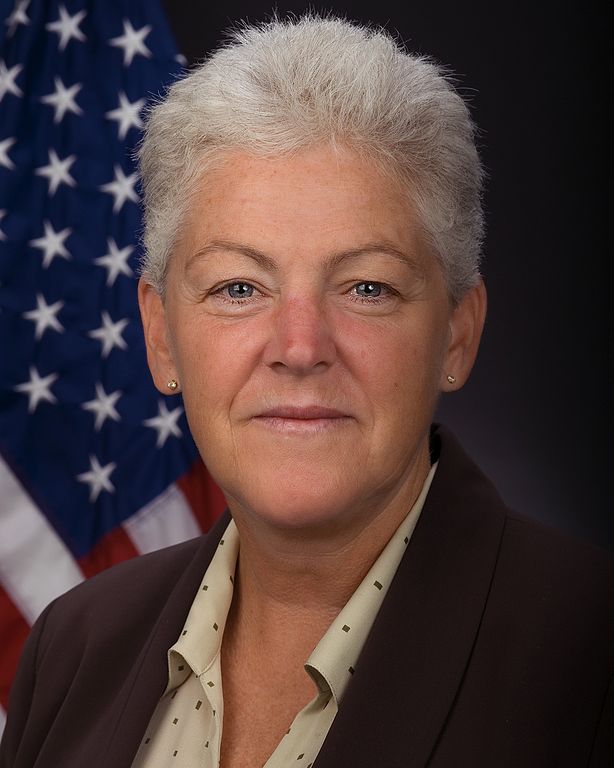
On July 18, 2013, the U.S. Senate confirmed President Barack Obama’s nomination of Gina McCarthy to lead the U.S. Environmental Protection Agency. Since 2009, Gina has served as Assistant Administrator of EPA’s Office of Air and Radiation, and to our good fortune, also served as the Chair of the Global Methane Initiative (GMI) Steering Committee. We thank her for her leadership and guidance over the past four years and for her dedication to improve air quality and reduce greenhouse gas emissions, including methane.
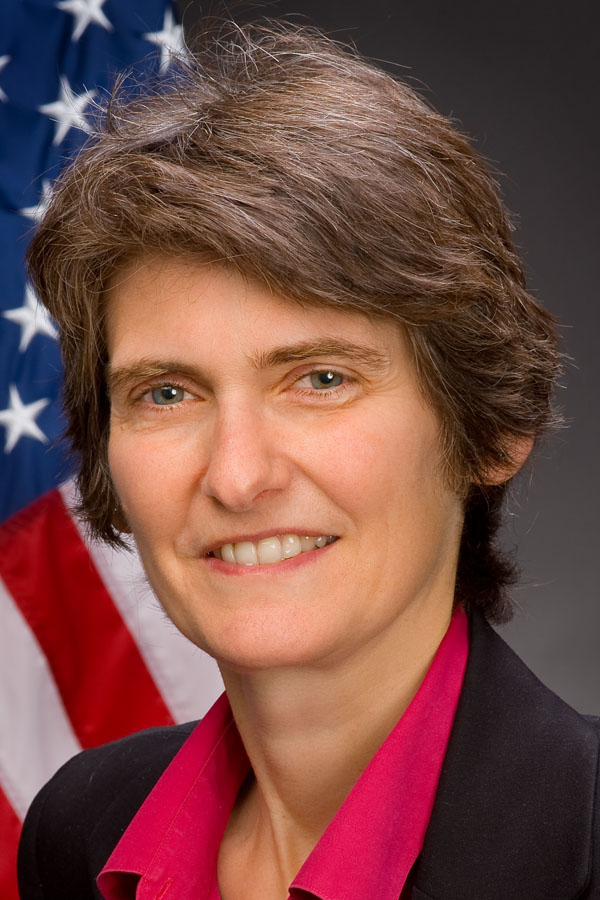
Janet McCabe, U.S. EPA Acting Assistant Administrator will now serve as the Chair for the Steering Committee. She is already very familiar with GMI as she led the Committee meeting in Vancouver during the Methane Expo 2013. The ASG is very happy to welcome Janet McCabe to GMI as Chair. We look forward to her leadership as we continue the important work of the Initiative.
Methane Reduction Efforts in Oil and Gas Sector
The August 2013 issue of U.S. EPA’s Natural Gas STAR’s
Partner Update
 provides updates on two GMI projects: Ukraine: Since first partnering with the U.S.
EPA in 2007, Ukrtransgaz
provides updates on two GMI projects: Ukraine: Since first partnering with the U.S.
EPA in 2007, Ukrtransgaz
 ,
a Ukrainian gas transportation system operator, has cut methane emissions by nearly
600 million cubic meters and achieved more than $415 million in fuel savings. Concentrating
on direct inspection and maintenance (DI&M) efforts, the company developed six innovative
“mobile laboratories” with field emission monitoring and measurement equipment and
trained staff to implement DI&M. Ukrtransgaz is working on a comprehensive study
of methane emissions across its infrastructure to identify additional cost-effective
reductions.
,
a Ukrainian gas transportation system operator, has cut methane emissions by nearly
600 million cubic meters and achieved more than $415 million in fuel savings. Concentrating
on direct inspection and maintenance (DI&M) efforts, the company developed six innovative
“mobile laboratories” with field emission monitoring and measurement equipment and
trained staff to implement DI&M. Ukrtransgaz is working on a comprehensive study
of methane emissions across its infrastructure to identify additional cost-effective
reductions.
 Ukrtransgaz uses an innovative repair method: The company installs a two-layer sleeve
on a high diameter gas pipeline. From left to right: workers adjust rings and sleeves,
assemble the sleeve, and weld together.
Ukrtransgaz uses an innovative repair method: The company installs a two-layer sleeve
on a high diameter gas pipeline. From left to right: workers adjust rings and sleeves,
assemble the sleeve, and weld together.
Ecuador: A team from the Escuela
Superior Politécnica del Litoral (ESPOL)
 assessed methane emissions from more than a thousand “orphan” oil wells in the Ancón
region of Ecuador. The team studied the economic feasibility of capturing, distributing,
and using casinghead
gas
assessed methane emissions from more than a thousand “orphan” oil wells in the Ancón
region of Ecuador. The team studied the economic feasibility of capturing, distributing,
and using casinghead
gas
 from these orphan wells, which are abandoned or suspended from operation during
some or all of the year. Methane emissions from a 100-well sample measured an average
of 270 standard cubic feet per well, and the
assessment
from these orphan wells, which are abandoned or suspended from operation during
some or all of the year. Methane emissions from a 100-well sample measured an average
of 270 standard cubic feet per well, and the
assessment
 ultimately concluded that the most cost-effective option would be to cap the wells.
In August, ESPOL presented the project’s results at the Latin American and Caribbean
Conference for Engineering and Technology in Mexico.
ultimately concluded that the most cost-effective option would be to cap the wells.
In August, ESPOL presented the project’s results at the Latin American and Caribbean
Conference for Engineering and Technology in Mexico.
Identifying Good Candidate CMM Projects
GMI supports the identification of cost-effective coal mine methane (CMM) capture and use projects. Below are highlights from recently completed studies by U.S. EPA.
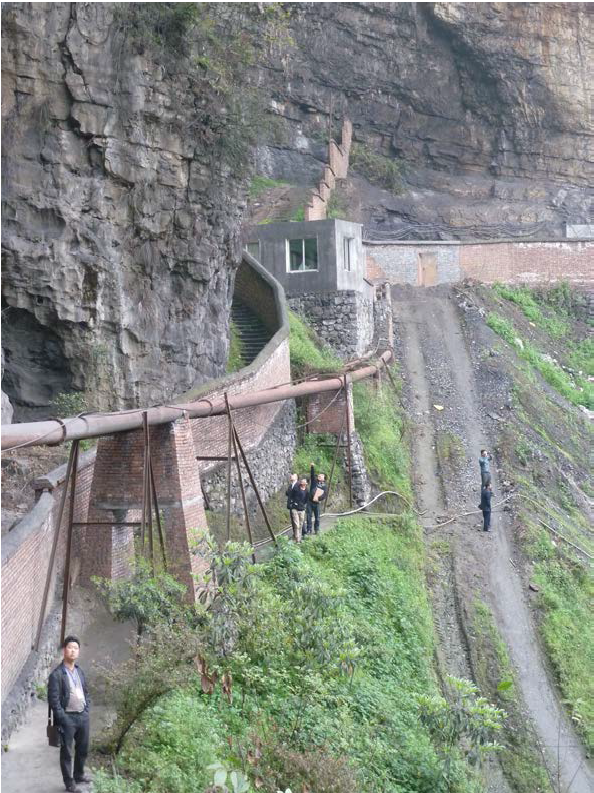 Natural gas pipeline coming from coal seam #5 at Fuhong Mine, China.
Natural gas pipeline coming from coal seam #5 at Fuhong Mine, China.
China: U.S. EPA published two pre-feasibility reports that examine the potential for CMM recovery and use projects at Yanjing Mine and Fuhong Mine in southwest China. Both mines are expected to see dramatic growth over the next few years. At Yanjing Mine, located within the Chongqing Municipality, investigators found the potential for a pilot gas drainage program in which coal seams would be hydraulically fractured to extract gas. The program would increase both coal production and worker safety by decreasing methane concentrations in ventilation air. Additionally, the mine’s proximity to a well-developed natural gas distribution infrastructure means that the mine could supply methane directly to the local gas market. Overall, the project would reduce methane emissions by 883,895 tonnes of carbon dioxide equivalent (CO2e). At Fuhong Coal Mine in Guizhou Province, mining is expected to double in the near future, making CMM recovery all the more important. The study suggests two end-use options: internal combustion engines for power generation at the mine, or combined power generation and on-site use for drying of low quality coal. Either option would reduce carbon emissions by 504,000 tonnes of CO2e.
Mongolia: U.S. EPA conducted a
pre-feasibility study
 examining the potential for employing vertically drilled wells as a pilot project
to capture methane gas to generate power at the Naryn Sukhait coal mine, located
in the province of Ömnögovi just north of the Mongolian-Chinese border. New mining
projects will support Mongolia’s economic growth in the coming years, and a CMM
recovery project at Naryn Sukhait would both reduce greenhouse gas emissions and
lessen increasing pressure on electricity resources in the region. Because the coal
deposit is in a region without developed natural gas infrastructure, the study suggests
that the best use of the CMM would be for on-site power generation at the mine.
Investigators found that the project could produce enough gas to fuel an 8.55-megawatt
generation facility, reducing emissions by 187,900 tonnes CO2e over the
life of the project.
examining the potential for employing vertically drilled wells as a pilot project
to capture methane gas to generate power at the Naryn Sukhait coal mine, located
in the province of Ömnögovi just north of the Mongolian-Chinese border. New mining
projects will support Mongolia’s economic growth in the coming years, and a CMM
recovery project at Naryn Sukhait would both reduce greenhouse gas emissions and
lessen increasing pressure on electricity resources in the region. Because the coal
deposit is in a region without developed natural gas infrastructure, the study suggests
that the best use of the CMM would be for on-site power generation at the mine.
Investigators found that the project could produce enough gas to fuel an 8.55-megawatt
generation facility, reducing emissions by 187,900 tonnes CO2e over the
life of the project.
Kazakhstan: Following the success of a 2011
demonstration project at Lenina Mine in the Karaganda coal basin, U.S. EPA
conducted a
pre-feasibility study
 on six of the eight underground coal mines owned by ArcelorMittal. The study recommends
constructing several distributed power plants that will use fuel collected from
gas extraction stations at each mine. The use of distributed power plants is a cost-effective
measure for the region, which has minimal natural gas pipeline infrastructure, and
the power plants can be equipped to accommodate variations in gas flow and quality
from the six mines. ArcelorMittal is now evaluating proposals to develop a utilization
project at the site. Overall, net annual emission reductions for the project are
estimated to be 1,786,126 tonnes CO2e.
on six of the eight underground coal mines owned by ArcelorMittal. The study recommends
constructing several distributed power plants that will use fuel collected from
gas extraction stations at each mine. The use of distributed power plants is a cost-effective
measure for the region, which has minimal natural gas pipeline infrastructure, and
the power plants can be equipped to accommodate variations in gas flow and quality
from the six mines. ArcelorMittal is now evaluating proposals to develop a utilization
project at the site. Overall, net annual emission reductions for the project are
estimated to be 1,786,126 tonnes CO2e.
Subcommittee Updates
Administrative Support GroupThe Agriculture, Municipal Solid Waste, and Municipal Wastewater subcommittees are in the initial stages of planning a tri-sector subcommittee meeting in Brazil in early 2014. Look for additional information soon.
Based on feedback received at Methane Expo 2013, ASG updated the GMI Partner Action Plan Guidance Document to help Partners drive current and future project development in their countries.
AgricultureThe subcommittee provided feedback and additional case studies for inclusion in GMI’s “Successful Applications of Anaerobic Digestion from Across the World. (PDF) (24 pp, 1.62 MB)” U.S. EPA expects to publish the final document later this year. In the future, GMI may update the guide to include financial and policy incentives that promote anaerobic digester systems around the world. The subcommittee set a date for its next meeting, to be held online, as 24 September 2013. The meeting will include updates from Partner countries and a discussion of financial incentives supporting anaerobic digester development.
An
International Workshop on Development of Coal-Based Non-conventional Energy Resources
in India
 will be held November 12-13, 2013 in Ranchi. The organizer, Central Mine Planning
& Design Institute Limited, has released a call for papers. GMI encourages speakers
with CMM experience to apply. The deadline for abstracts is 16 September 2013.
will be held November 12-13, 2013 in Ranchi. The organizer, Central Mine Planning
& Design Institute Limited, has released a call for papers. GMI encourages speakers
with CMM experience to apply. The deadline for abstracts is 16 September 2013.
Proceedings from the Coal Subcommittee meeting held at Methane Expo 2013, including minutes, agenda, and presentations from the meeting and technical and policy sessions are now available on the GMI website. The next subcommittee meeting will take place 19–20 November 2013 in Geneva, Switzerland, in conjunction with the 8th Session of the United Nations Economic Commission of Europe (UNECE) Ad Hoc Group of Experts on Coal Mine Methane. Registration is available on the UNECE website.
Municipal Solid Waste
GMI, the China Association of Urban Environmental Sanitation, and the International
Solid Waste Association (ISWA) are co-hosting a
Landfill Gas Best Practices Workshop on 7 September 2013 in Wuhan, China.
This workshop is being held in conjunction with the
International Conference and Exhibition on Solid Waste Management and Recycling
 .
It will be largely based on GMI’s International
Best Practices Guide for Landfill Gas Energy with discussion tailored
to the characteristics of Chinese landfills.
.
It will be largely based on GMI’s International
Best Practices Guide for Landfill Gas Energy with discussion tailored
to the characteristics of Chinese landfills.
Additionally, the ISWA World Congress
 will be held on 7–11 October 2013 in Vienna, Austria.
will be held on 7–11 October 2013 in Vienna, Austria.
Proceedings from the Municipal Solid Waste Subcommittee meeting held at Methane Expo 2013 are now available on the GMI website. Available documents include final meeting minutes, country updates, and presentations from technical sessions. The subcommittee chairs expect to hold an online meeting in late 2013.
Municipal WastewaterFollowing discussions during Methane Expo 2013, the Municipal Wastewater Subcommittee is moving forward on the development of country-specific wastewater Action Plans. These plans will be useful tools in advancing wastewater project implementation, facilitating investment, and creating appropriate policy frameworks that support methane abatement, recovery, and use in GMI Partner countries. The subcommittee also finalized a sector fact sheet, now available on the GMI website in English, Spanish, Chinese, and Russian.
Oil and Gas
The next meeting of the Oil and Gas Subcommittee has been confirmed for 28 October
2013 in San Antonio, Texas, United States. The meeting will be co-located with U.S.
EPA Natural Gas STAR’s
Annual Implementation Workshop
 ,
which brings together Natural Gas STAR partners and industry experts to discuss
the latest cost-effective methane emission reduction technologies and practices.
The proposed draft agenda includes sharing of experiences with oil and gas sector
nationally appropriate mitigation actions (NAMAs); an update on the launch of the
CCAC Oil and Gas Initiative; member country updates; and a dialogue on subcommittee
goals and next steps for the upcoming year.
,
which brings together Natural Gas STAR partners and industry experts to discuss
the latest cost-effective methane emission reduction technologies and practices.
The proposed draft agenda includes sharing of experiences with oil and gas sector
nationally appropriate mitigation actions (NAMAs); an update on the launch of the
CCAC Oil and Gas Initiative; member country updates; and a dialogue on subcommittee
goals and next steps for the upcoming year.
GMI Outreach
Asia
Indonesia, June 2013: Officials in Indonesia recognize that investment in the solid waste sector will provide cost-effective methane reductions to achieve greenhouse gas reduction goals. To support their effort, U.S. EPA landfill sector staff met with the Ministries of Public Works and Environment to discuss how GMI can assist with training materials, such as a day-to-day landfill operations manual, and development of landfill gas (LFG) energy projects. This work will complement the World Bank’s forthcoming solid waste management improvement loan for Indonesia’s solid waste infrastructure. U.S. EPA and World Bank representatives discussed working together to disseminate lessons learned on these solid waste initiatives.
China, July 2013: U.S. EPA oil and gas sector staff conducted field measurements in the Shengli Oil field in Dongying and met with the China National Petroleum Corporation (SinoPec). Additionally, staff facilitated key meetings and discussions with SinoPec, the National Development and Reform Commission, and the National Energy Agency for upcoming project implementation of methane reduction projects.
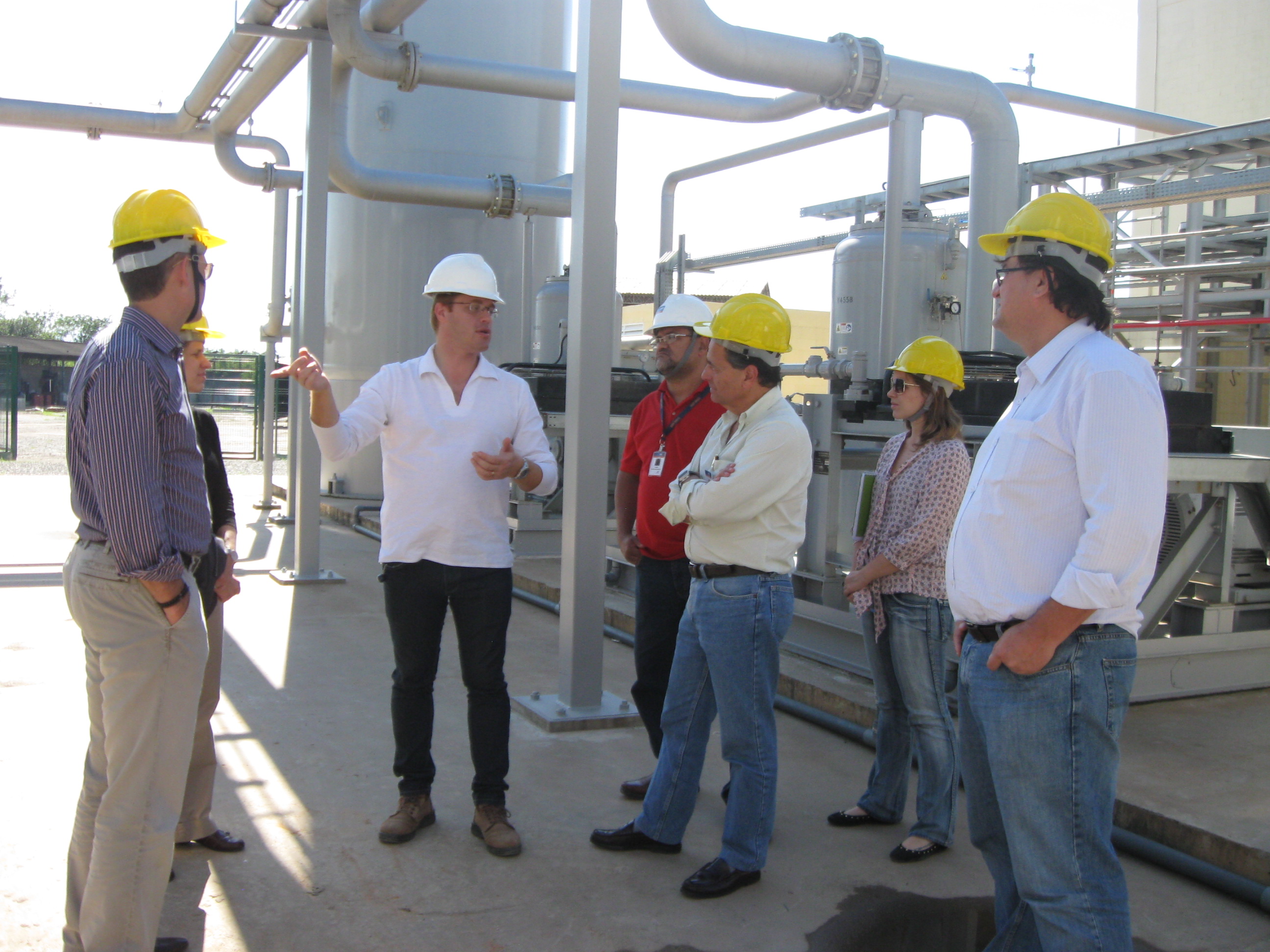
Officials tours the LFG purification and compression skid at the Gramacho Landfill
in Brazil.
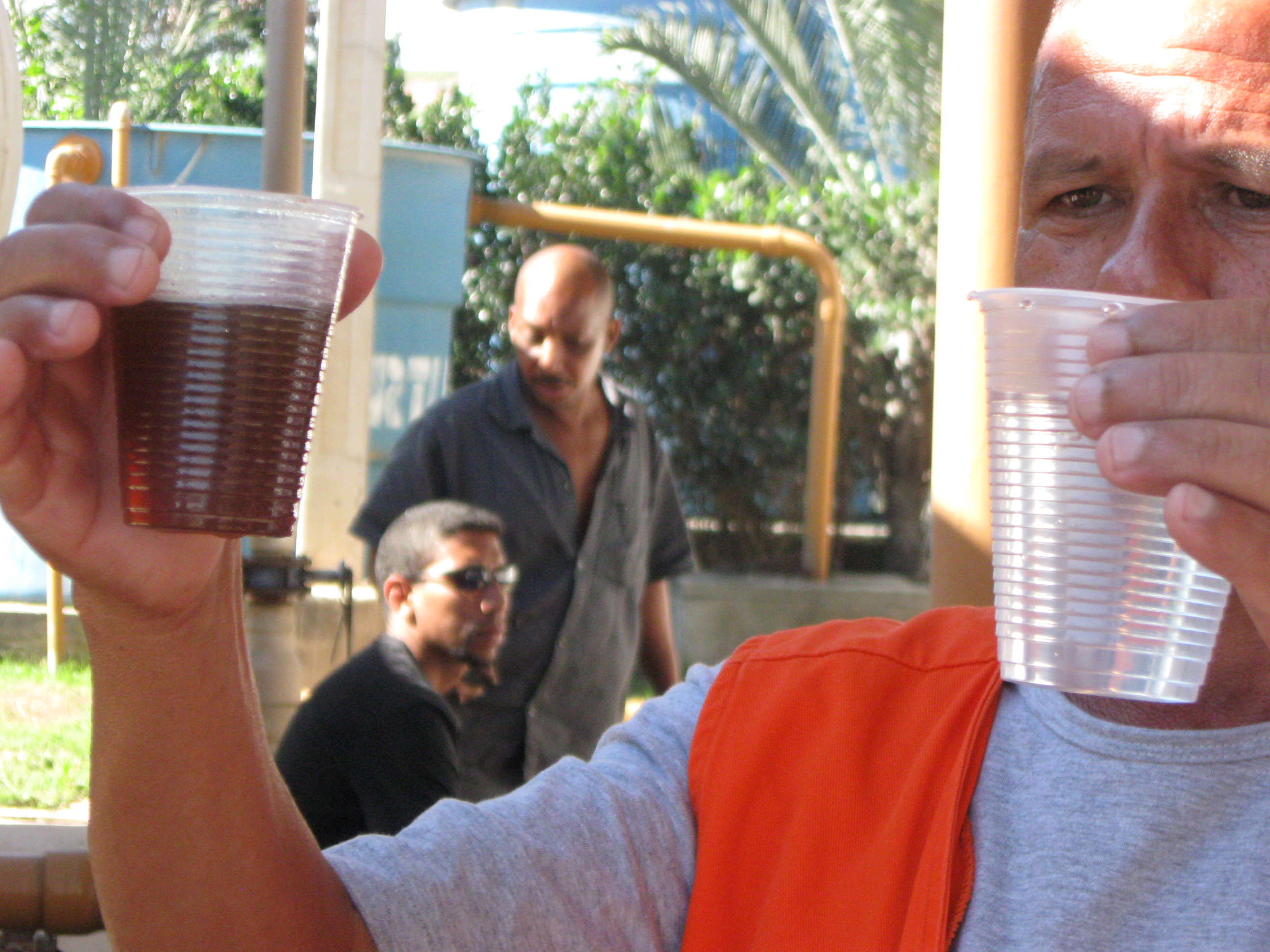
Comparing crude leachate to the liquid end product from the Gramacho leachate treatment
project.
Latin America
Colombia, May 2013: GMI partnered with two key stakeholder organizations
important to the advancement of LFG utilization in Colombia to conduct two training
workshops in Bogota. Roughly 110 participants, including project developers, utilities
representatives, and solid waste services operations companies, attended. The first
workshop discussed landfill gas utilization options for members of the national
association of public electric and gas utilities (ANDESCO). The second workshop
provided methods to improve the quality of LFG-related data entered into Colombia’s
national landfill database, the Single Information
System
 (a public database of landfill operations and solid waste management data). GMI’s
partner for this workshop, the Superintendent of Residential Public Services (SSPD),
hopes the training will help produce a comprehensive database of candidate landfills
useful to international LFG project developers. Presentations for the
utility and
data quality workshops are available on the GMI website.
(a public database of landfill operations and solid waste management data). GMI’s
partner for this workshop, the Superintendent of Residential Public Services (SSPD),
hopes the training will help produce a comprehensive database of candidate landfills
useful to international LFG project developers. Presentations for the
utility and
data quality workshops are available on the GMI website.
Brazil, July 2013: GMI representatives met with stakeholders in Florianopolis,
Brazil, to discuss the potential for a multi-sector training activity with the State
of Santa Catarina that would be held in conjunction with the tri-subcommittee meeting
for the Municipal Solid Waste, Municipal Wastewater, and Agriculture subcommittees.
GMI staff also made several municipal solid waste site visits, including a trip
to the
Gramacho Landfill
 to evaluate its LFG utilization project and pilot leachate treatment project.
to evaluate its LFG utilization project and pilot leachate treatment project.
News from the Climate and Clean Air Coalition
CCAC met in Bonn, Germany, during the
Bonn Climate Change Conference
 in June. Kaveh Zahedi, Interim Head of the CCAC Secretariat, moderated a session
discussing CCAC’s work addressing short-lived climate pollutants (SLCPs). Panelists
from the World Health Organization, the World Bank, and the United Nations Environment
Programme, among others, participated in the session.
in June. Kaveh Zahedi, Interim Head of the CCAC Secretariat, moderated a session
discussing CCAC’s work addressing short-lived climate pollutants (SLCPs). Panelists
from the World Health Organization, the World Bank, and the United Nations Environment
Programme, among others, participated in the session.
CCAC is celebrating its one-year anniversary, marked by the publication of “A
Year in the Coalition: Charting a Successful Year 2012–2013. ”
 The report highlights CCAC’s achievements including its growth to more than 50 Partners,
the formation of high-level regional partnerships, and the launch of its first global
action-focused initiative on the reduction of methane and black carbon pollutants
from municipal solid waste.
The report highlights CCAC’s achievements including its growth to more than 50 Partners,
the formation of high-level regional partnerships, and the launch of its first global
action-focused initiative on the reduction of methane and black carbon pollutants
from municipal solid waste.
In July, CCAC
met in Mexico City, Mexico
 ,
to approve further funds to help cities reduce methane emissions from landfills
as part of its “Cities Reducing Emissions Through Improved Waste Management” initiative.
Rio de Janeiro (Brazil), Accra (Ghana), and Dhaka (Bangladesh) will develop on-the-ground
action plans to mitigate SLCPs by making scalable improvements in waste management
practices as part of the initiative. The initiative will not only mitigate SLCPs,
but also create co-benefits such as job creation, improved public health, and improved
environmental conditions.
,
to approve further funds to help cities reduce methane emissions from landfills
as part of its “Cities Reducing Emissions Through Improved Waste Management” initiative.
Rio de Janeiro (Brazil), Accra (Ghana), and Dhaka (Bangladesh) will develop on-the-ground
action plans to mitigate SLCPs by making scalable improvements in waste management
practices as part of the initiative. The initiative will not only mitigate SLCPs,
but also create co-benefits such as job creation, improved public health, and improved
environmental conditions.
In July 2013, U.S. EPA traveled to Rio de Janeiro and Accra to conduct follow-up
meetings related to the initiative. In Rio de Janeiro, U.S. EPA worked with the
city’s waste management body, COMLURB
 ,
to finalize a workplan and lay out activities with the city for the coming year.
The workplan is based on five key activity areas:
,
to finalize a workplan and lay out activities with the city for the coming year.
The workplan is based on five key activity areas:
- Develop SLCP emissions baseline and potential reductions
- Optimize waste collection
- Enhance landfill operations and energy recovery
- Divert organic material from landfills
- Increase paper and cardboard recycling rates
Recent Developments and Resources
Mexico Unveils National Climate Change Strategy
In June, Mexico’s government unveiled a
National Climate Change Strategy to foster “green growth” in the country,
building upon climate change legislation that set a national goal of cutting emissions
50 percent below 2000 levels by 2050 and generating 35 percent of electricity using
renewable resources by 2024. The plan focuses on eight “axes of action,” including
reducing SLCPs such as black carbon and methane.
U.S. Government Moves Forward on Climate Action Plan
The U.S. government has announced its
National Climate Action Plan
 outlining actions it will take to reduce carbon pollution, prepare for the impacts
of climate change, and lead efforts to address climate change globally. The plan
incorporates a significant domestic effort on reducing methane and highlighted the
importance of GMI as part of U.S. international climate efforts. Gina McCarthy,
former interim chair of the GMI steering committee, was confirmed as the new EPA
Administrator in July and will be leading the agency’s efforts to enact the plan.
outlining actions it will take to reduce carbon pollution, prepare for the impacts
of climate change, and lead efforts to address climate change globally. The plan
incorporates a significant domestic effort on reducing methane and highlighted the
importance of GMI as part of U.S. international climate efforts. Gina McCarthy,
former interim chair of the GMI steering committee, was confirmed as the new EPA
Administrator in July and will be leading the agency’s efforts to enact the plan.
Environment Canada Releases New Municipal Solid Waste Report
At Methane Expo 2013, Environment Canada unveiled its
Technical Document on Municipal Solid Waste Organics Processing,
developed to guide government officials and project stakeholders through the project
design and development process. The report presents lessons learned in organic waste
management and processing and provides science-based, objective, user-friendly information
about municipal solid waste planning and operations.
International Energy Agency Calls for Reduction of Methane Emissions
The International Energy Agency has released a new special report titled
Redrawing the Energy-Climate Map
 that identifies worldwide energy measures that can slow the impacts of climate change
at no net economic cost. The report identifies minimizing methane emissions from
upstream oil and gas production as one of four major policies that, when enacted
together, would cut global methane releases into the atmosphere by almost half.
that identifies worldwide energy measures that can slow the impacts of climate change
at no net economic cost. The report identifies minimizing methane emissions from
upstream oil and gas production as one of four major policies that, when enacted
together, would cut global methane releases into the atmosphere by almost half.
Ecofys Launches NAMA Database
Ecofys, an international consulting firm, launched a
database of NAMAs
 and related activities happening around the world. Using a Wiki platform, the site
fosters information sharing activities so that countries and other participants
can learn from these experiences and gain insights into how mitigation activities
can be undertaken within the NAMA framework.
and related activities happening around the world. Using a Wiki platform, the site
fosters information sharing activities so that countries and other participants
can learn from these experiences and gain insights into how mitigation activities
can be undertaken within the NAMA framework.
World Bank Publishes Report on Carbon Pricing Initiatives
In May, the World Bank published the
Mapping Carbon Pricing Initiatives
 report, which maps existing and emerging carbon pricing initiatives around the world.
The working paper examines the uncertainty in the world carbon market following
in the context of a downturned economy and reviews mechanisms to stabilize the price
of carbon.
report, which maps existing and emerging carbon pricing initiatives around the world.
The working paper examines the uncertainty in the world carbon market following
in the context of a downturned economy and reviews mechanisms to stabilize the price
of carbon.
In this edition:
- Thank You GMI Steering Chair Gina McCarthy! Welcome New Steering Chair Janet McCabe!
- Methane Reduction Efforts in Oil and Gas Sector
- Identifying Good Candidate CMM Projects
- Subcommittee Updates
- GMI Outreach
- News from the Climate and Clean Air Coalition
- Recent Developments and Resources
ASG Corner

Welcome to Whitney Stohr—the ASG’s newest Oak Ridge Institute for Science and Education (ORISE) fellow! Whitney will be supporting GMI activities in the coming months.
Whitney comes to the ASG with a law degree from Gonzaga University and a Master of Laws in international law from George Washington University. She is currently working toward a master’s degree in ecological restoration at the University of Florida. Before joining GMI, Whitney was a visiting attorney at the Environmental Law Institute in Washington, D.C., and gained additional experience as an intern with the National Oceanic and Atmospheric Administration and in the U.S. Senate. Whitney enjoys international travel, museums, and ethnic food. Please join us in welcoming her to the GMI team!
Sincerely,

Henry Ferland
Co-Director, ASG

Monica Shimamura
Co-Director, ASG